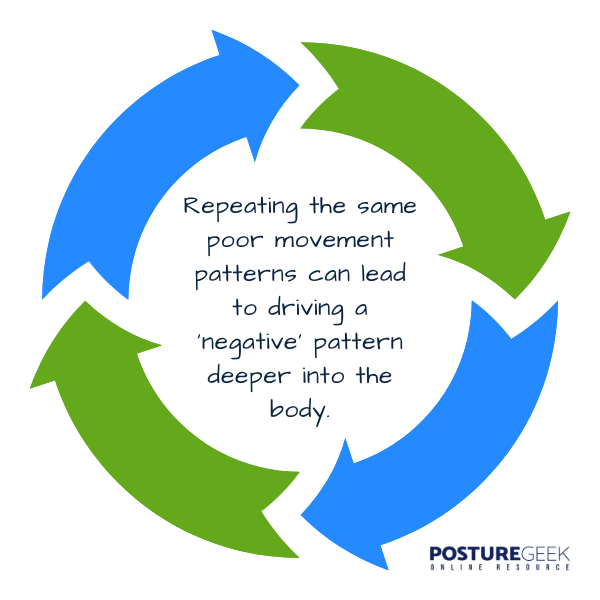How Your Body Adapts to What You Do Most: The Importance of Good Posture
When you perform the same activity over and over again, your body starts to adapt so that it can make that activity more accessible. This is often referred to as "muscle memory."
PostureGeek.com Tweet

Do you know how your body adapts to what you do most? It’s pretty fascinating and has a lot to do with your posture. When you perform the same activity over and over again, your body starts to adapt so that it can make that activity more accessible. This is often referred to as “muscle memory.” For example, suppose you play the guitar every day for an hour. In that case, your muscles will start remembering how to hold the instrument correctly. This is also true for your posture. Sitting in a hunched position all day long at work, your body will start to adapt by rounding your shoulders and hunching your back.
The importance of proper posture care cannot be understated.
Maintaining good posture helps to improve your breathing and digestion, and it can also help to prevent pain in the lower back, shoulders, and neck.
If you sit at a desk all day, make sure to take breaks often to walk around. And if you lift heavy objects regularly, be sure to use proper form and technique.
Helping your body adapt to the activities you do most is an essential step in improving your posture and overall health.
What do we mean by proper alignment?
Good posture is the position in which your bones are correctly aligned. This minimizes the strain on your muscles and ligaments and helps you avoid injuries.
PostureGeek.com Tweet

Good posture is the position in which your bones are correctly aligned. This minimizes the strain on your muscles and ligaments and helps you avoid injuries.
When you have good posture, your joints can move through their full range of motion. This helps keep your muscles strong and healthy. It also helps reduce wear and tear on your joints.
When you maintain good posture it also helps you breathe more efficiently. When your lungs have plenty of room to expand, you can take in more oxygen. This helps improve your overall health and well-being.
What are the landmarks for good standing posture?

- The ear should be in line with the middle of the shoulder.
- The shoulder should be in line with the hip.
- The hip should be aligned with the ankle, with the legs straight (at the knee).
Suppose you find it difficult to align these points in the standing position. In that case, it may be necessary to explore options, correct posture and bring greater body awareness.
How does your body adapts to what you do most?
The activities that you do most often have a significant impact on your posture. For example, if you sit at a desk all day, your shoulders and back will start to round. This recurring pattern can lead to overall posture changes and potentially influence the spine’s natural shape.
So if you want to improve poor posture, start by paying attention to the activities you do most. Are you sitting at a desk all day? Make sure to sit up straight and take breaks often to walk around. Are you lifting heavy objects regularly?
Knowing this information is really important because it can help improve your posture. Having good posture means that your spine is in alignment and your muscular system is balanced. This helps prevent pain in the lower back, shoulders, and neck. It also helps improve your breathing and digestion.
Make sure to use proper form and technique. By being aware of how your body adapts to what you do most, you can help improve your own posture and overall health.
How does muscle memory work?

Whenever you perform the same activity over and over again, your body starts to adapt so that it can make that activity easier. This is often referred to as “muscle memory.” For example, if you play the guitar every day for an hour, your muscles will start to remember how to hold the instrument in the right way.
This is also true for your posture. For example, if you sit in a hunched position all day long at work, your body will start to adapt by rounding your shoulders and hunching your back.
Muscle memory is a type of learning that occurs when muscles develop the ability to perform an action more easily with practice. This phenomenon can be explained by changes that occur at the neurological level.
With repeated practice of an activity, nerve cells form new connections that allow the muscles to perform the action more efficiently. This is why it’s so important to focus on proper form and technique when performing any activity, especially if you want to improve your posture.
By being aware of how your body adapts to what you do most, you can help posture and overall health.
Muscle Tension and maintaining good posture
It’s not just about the activities you do, but also how you do them. For example, if you’re constantly tense or using poor form, your muscles will also start to remember that. This can lead to muscle imbalances, pain, and poor posture.
So it’s essential to focus on relaxation and proper technique, even when doing everyday activities like brushing your teeth or walking.
Being mindful of how you move can help improve your posture and prevent muscular pain.
What can you do to help maintain proper posture:
You can do a few things to help relieve muscle tension and improve your posture.
First, focus on relaxing your muscles. If you’re constantly tense, your muscles will also start to remember that.
Second, focus on proper form and technique. Even when doing everyday activities like brushing your teeth or walking, be mindful of how you move. And,
Third, take breaks often to stretch or walk around.
By being aware of how your body adapts to what you do most, you can help improve your posture and overall health.
Slouching in a chair

One of the most common posture problems is slouching in a chair. This often happens when people sit at a desk all day long. When you slouch, your spine is out of alignment, and your muscles are imbalanced. This can lead to lower back, shoulders, and neck pain. It can also cause problems with your breathing and digestion.
To help improve good sitting posture, make sure to sit up straight and take breaks often to walk around. You should also focus on using proper form and technique when lifting heavy objects. Helping your body adapt to the activities you do most is an essential step in improving your posture and overall health.
Can you correct years of poor posture?
It can be difficult to correct if you have had bad posture for years. However, it is possible to improve posture with time and effort.
The first step is to be aware of the activities that you do most. For example, if you sit at a desk all day, make sure to take breaks often to walk around. And if you lift heavy objects regularly, be sure to use proper form and technique.
Helping your body adapt to the activities you do most is an essential step in improving your posture and overall health. You should also focus on strengthening the muscles in your back and shoulders. This will help support your spine and improve your posture.
With time and effort, you can improve your posture and reduce the pain associated with bad posture.
The importance of seeking help if you have posture problems
Bad posture can lead to a number of health problems, so it’s important to seek help if you’re experiencing pain or discomfort. A healthcare professional can assess your situation and recommend the best course of treatment. In some cases, surgery may be necessary to correct the problem.
Finally
The bottom line is that your posture is important, and it’s something that you should be aware of on a daily basis. By paying attention to the activities you do most often, you can ensure that your body is in the correct position and not adapting to any bad habits. So keep moving, stay active, and be conscious of your posture, and you’ll help yourself stay in good health! Thanks for reading.
PLEASE NOTE
PostureGeek.com does not provide medical advice. This information is for educational purposes only and is not intended to be a substitute for professional medical attention. The information provided should not replace the advice and expertise of an accredited health care provider. Any inquiry into your care and any potential impact on your health and wellbeing should be directed to your health care provider. All information is for educational purposes only and is not intended to be a substitute for professional medical care or treatment.
